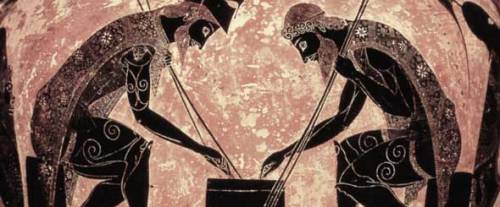When Socrates refers to ‘Hades’ in Plato’s dialogue Phaedo, he describes it as the afterlife reserved for the good; and he describes the good man as the ‘philosopher.’
Throughout Antiquity, there were many variations on the theme of life after death, all of which predate Christianity and Islam. The insistance on a “final judgement” in both Christianity and Islam comes directly from the early civilizations of Mesopotamia, the Mediterranean, and the Levant.
Life Goes On (and on)
The study of ancient religion uncovers cycles in the popularity of beliefs concerning the afterlife, going in and out of fashion, just as they still do today. Ancient Religion as a category
Each semester, in the introductory World Religions course, I would present the treatise on the eternal nature of the soul by Plato in the Myth of Er during our class on ancient religion and ancient Greek religion and thought.
Across six semesters of the same presentation, not once did I meet a student who was already aware that Plato and the Pythagoreans were literary sources for the concept of the eternal soul, and for a Western notion of reincarnation.
Is this knowledge reserved for specialists in religious studies? It shouldn’t be. **
In Plato’s dialogue Gorgias, Socrates gives another variation on the theme, stating that the soul is judged in death where the good are sent to the Island of the Blessed and the wicked are confined in Tartarus.
But in the Greek Bronze Age, before Socrates and Plato, Hades is conceived of as a general place of the dead. None of the earliest references to Hades speak of punishment.
And it seems that paradise was not for us either. The Elysium of the poet Homer and the Island of the Blessed of the poet Hesiod were places of paradise reserved for demigods and maybe a few wonderful, special humans.
If the realm of Hades was reserved for the dead, it was for all dead mortals in the earliest of references. (Hades is, of course, also the name of the brother of Zeus, who rules over the world of the dead)
It is the realm of Tartarus, however, that is described by both Hesiod and Homer as a dungeon where the evil are punished. By the beginning of the Roman Empire, Tartarus is described by Virgil as almost boundless, and surrounded by a flaming river that cannot be crossed. We also know that the Romans believed in a positive experience of the after-life for gallant soldiers.
It seems that at different times in antiquity, various ancient civilizations entertained only vague notions of a dark underworld.
In Homer’s Odyssey, the ‘shadow’ of Achilles (in the underworld) states that he would rather be a slave in a poor man’s house (in life) than a king in the underworld, implying that he finds no reward for his heroism in death.
There is also literary evidence that death was seen as a final end. In the Hebrew text, Qoheleth (Ecclesiastes) dating at least as early as the Macedonian period, death is described as the final end of life, where there is no love, no work, no ambitions and no knowledge. (Eccles. 9:10)
Some scholars insist that in the Sumerian-Akkadian civilizations (the oldest Mesopotamian civilization) there was no complete notion of an eternal existence after death. The Epic of Gilgamesh seems to describe the search for an eternal earthly life, or immortality on earth.
Ancient Egyptian religion might be the most influential and most ageless of all religions of antiquity. My eleven-year-old son recently reminded me that the ancient Egyptians believed that the heart of the dead is ‘weighed’ in a weigh station where the gods Ma’at and Anubis decided on the fate of the dead.
If virtuous enough, the dead would have life eternal with great privileges, but if not, the dead experienced no afterlife at all.
The ancient Egyptian concept of life after death developed and changed over the centuries and cannot be easily summarized. Some of the pyramid texts are very early (almost 5000 years old) and indicate a strong belief in the judgement of the dead according to the quality of life.
By the development of Christianity in the first and second centuries, eternal life seems to have become an obligation; we have no choice but to live forever. The student of religion would be hard-pressed to find a contemporary religion that directly contradicts this concept of the eternal soul.





